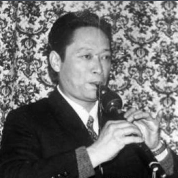Zhang Zuyu
Organized by 未知领地 on 2022-03-28

Zhang Zuyu (1941~2006), born in Kunming, Yunnan, was a primary school student. Influenced by the old artists of Kunming's "Chinese Music Society", he learned bamboo flute and often participated in local Chinese music performances. In 1959, he was transferred from a student of Yunnan Industrial School to a professional actor. In 1960, he went to Yunnan Arts Institute to study bamboo flute playing from Lin Yin and Chen Wentao. He was a solo performer of the Yunnan Song and Dance Troupe. He lives in a minority area that is good at singing and dancing, so he has the opportunity to go to the minority area to live deeply and learn from folk artists, such as Bawu of Hani, Hulusi of Dai, Tuliang of Jingpo, etc. He also composed Bau's solo "Beautiful Frontier", which expresses the picturesque style of Yunnan with a graceful and euphemistic melody. His playing has a good grasp of the Yunnan minority style. Due to an osteoma in his left leg in 1967, he was disabled for life and rarely performed on stage. In the face of adversity, he persevered, insisted on studying Bawu's creation and reform, and achieved some achievements. His representative works include "Yi People Sing Happy Songs", "Happy Bawu" and "Dawn of Jingpo Mountain". Member of the Chinese Musicians Association. Died 2006.12.24.
In the 1960s, he went to the frontier minority areas to learn the performance and production of national musical instruments such as Bawu, Hulusi and Tuliang from folk artists. In 1983, together with Tan Weiyu, a teacher of the Folk Music Department of the Shanghai Conservatory of Music, they jointly produced the "14-key 24-Blue Wood Wind Reform Bawu". Won the third prize of Science and Technology Progress Award of the Ministry of Culture. He has visited the former Soviet Union, Norway, Switzerland, Austria, the Netherlands, Singapore, Thailand, Malaysia, Indonesia and other countries successively.
Similar artist
Bian Ge is a young Chinese flute player, flute and flute teacher, and music creator. He is good at flute, xiao, xun, ocarina, cucurbit flute, bawu and other wind instruments.
read >>
Feng Yu, director of the Hulusi Bawu Professional Committee of the Chinese Nationalities Orchestra Society; examiner of the National Social Artistic Proficiency Examination Committee of the Chinese Nationalities Orchestra Society; president of the Sichuan Hulusi Research Association; under the tutelage of the famous cucurbit flute artist Mr. Li Chunhua.
read >>
Xi Li Hanle, a young cucurbit player, vice president of Xishuangbanna cucurbit Bawu Association.
read >>
He Yuan is a national first-class performer, composer and music producer of the China Broadcasting Art Troupe.
read >>
Ding Xiaokui is a young wind musician of the Central Chinese Orchestra.
read >>
Involving musical instruments
Hulusi (pinyin: hú lu sī), also known as "calabash flute", is a musical instrument of ethnic minorities in Yunnan. Hulusi originated in Lianghe County, Dehong Dai and Jingpo Autonomous Prefecture, and is mainly popular in Dai, Achang, Wa, De'ang and Brown. The Dehong and Lincang areas in Yunnan where ethnic groups live together are rich in local colors.
Involved portfolio
Involved news
Organized by 碍与暧 on 2024-03-11
In the southern coastal areas, due to the high humidity and obvious temperature changes throughout the year, the maintenance of wooden and bamboo wind instruments such as fenugreek is particularly important. The following are suggestions and specific measures for hulusi maintenance in view of the climate characteristics of the southern coastal areas.
read >>
Organized by 氯化钠 on 2024-03-11
With the continuous integration of modern technology and traditional craft, fenugreek, an ancient national musical instrument, is also constantly innovating and developing, and a new type of multi-functional fenugreek has emerged. This new type of fenugreek not only retains the traditional graceful sound and strong national customs, but also adds a number of practical functions on the basis of the original, further improving the performance experience and teaching efficiency.
read >>
Organized by 风月呢喃 on 2024-03-11
Hulusi, as a traditional wind instrument of ethnic minorities in southwest China, has been deeply loved by music lovers for its beautiful, deep feeling and poetic tone. So, what exactly gives fenugreek such intoxicating sound?
read >>
Organized by 阿蘅 on 2024-03-11
Hulusi, as a typical representative of the traditional wind instrument of the ethnic minorities in southwest China, has a melodious tone and is deeply loved by the majority of music lovers. When discussing the charm of hulusi, its rich mode system is particularly worthy of attention. The variety of tone of hulusi enables it to perform a variety of different styles and emotional music.
read >>
Organized by 辞惘 on 2024-03-11
Among the various skills of hulusi performance, Boeing is an extremely important expression technique, which gives the unique charm of lively, graceful and melodious to hulusi music.
read >>

 渝公网安备 50010702504639号
渝公网安备 50010702504639号